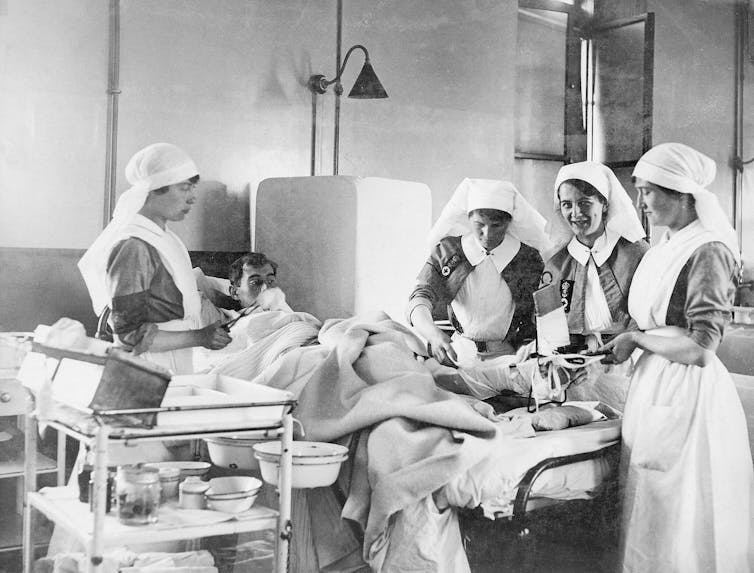Whether an actual bereavement or a loss of experience, everyone has lost something to COVID. From early on in the pandemic, grassroots memorials sought to acknowledge this collective experience, including the national COVID memorial wall in London and the annual national day of reflection organised by the Marie Curie charity.
In September 2023, the UK Commission on COVID Commemoration released its final report on how a more official reckoning with the pandemic’s legacy should be shaped. It outlines ten recommendations.
The pandemic has affected people in vastly different ways. How governments, institutions and the wider public have responded has varied enormously, too. It is also still ongoing, which complicates things further.
New variants of the virus are on the rise. And nearly two million people in the UK alone continue to suffer with long COVID.
As immunologist Sheena Cruickshank put it recently, “it may feel like we should all be done with COVID-19, but sadly COVID-19 is not done with us”.
My research into memorial culture and modernism shows how the lack of a clear or coherent narrative for an event like a pandemic makes commemorating it that much harder. The official and cultural memory of the 1918 flu pandemic was subsumed into that of the first world war – and it remained largely unremembered, until COVID brought it back to public attention.

Remembrance and preparedness
From October to December 2022, the UK Commission on Covid Commemoration held a six-week period of public consultation. It conducted surveys, garnering 5,000 responses. It also met with affected groups, including bereaved families and long-COVID sufferers, as well as groups that are sceptical about the illness and lockdown strategies.
The report is, to my mind, admirably well considered, sensitive to the difficulties of the task. It firmly establishes why memorialising all deaths that have occurred during the pandemic – COVID-related or otherwise – is necessary. This chimes with previous research that has found that COVID-related grief is particularly difficult and that public commemoration is necessary for social cohesion.
The 11 members of the commission suggest a range of commemorations, which will now be considered for implementation by the British government. These include an annual day of reflection on the first Sunday in March, a new symbol to represent the pandemic, the establishment of a commemoration trust to organise and promote these initiatives, along with a commemoration website and an online book of remembrance.
The commissioners suggest creating ten green spaces across the country, each boasting a sculpture created by local artists. They recommend preserving those grassroots initiatives already in place, including the national COVID memorial wall.
Finally, they propose various educational initiatives. These include teaching the history of the pandemic in schools and college and collating oral histories from a wide range of groups, to, as the report puts it, “serve as a historical record of this period of our time and as an educational tool for future generations”. A postdoctoral fellowship programme is suggested, too, to enable future researchers to work with policy makers on national preparedness for natural hazards.
Most of these recommendations are fairly standard commemorative gestures. The decision to create disparate pockets of remembrance across the UK rather than one large-scale memorial is expected, as there is no consensus or agreed-upon version of the pandemic.
The choice of green spaces is usefully open-ended in terms of meaning. The memorial sculptures destined for each will, doubtless, be similarly open-ended, in keeping with the minimalist, abstract and predominantly secular tendencies in modern contemporary memorials in the UK.
The report also proposes council funding for local commemorative spaces in existing parks or green spaces, not unlike the many community-led first world war memorials.
The COVID symbol the commission suggests is a zinnia flower. Associated with remembrance, this floral design has similarities to the poppy which has long symbolised the first world war.
Large-scale commemorative gestures have already been seen in other nations. Most notably, Joe Biden’s first act as US president was, during his inaugural address, to lead a moment of silence to remember the then 400,000 Americans lost to the pandemic.
By contrast, the UK public has felt left down by its government’s response. The news, that former prime minister Boris Johnson reportedly said, in autumn 2020, that he would rather see “bodies pile high” than impose a third lockdown on the UK, has left a bitter taste.
Johnson’s subsequent clandestine evening trip, in April 2021, to the COVID memorial wall, as well as public scandals such as Partygate, have further angered the public. Bereaved family groups such as COVID-19 Bereaved Families for Justice are understandably anxious to see that their loved ones are remembered officially as names and not as numbers.
The commission is eager to distinguish itself from the contentious COVID-19 Inquiry. This report is a useful corrective to the inadequacies of the British government in commemorating the pandemic to date.
Some may wonder if it is too early to commemorate a pandemic that isn’t yet over. After 1914, nurses began to create memorials as soon as the first deaths happened. The British government established the Imperial War Museum in 1917, while the war was still ongoing. I have shown how necessary these commemorative gestures were. They ensured that the dead were not forgotten.
Whether the government will now do is yet to be seen. In its insistence both on remembrance and on preparedness – for the next pandemic that, experts agree, will happen – this report is a good first step.
Alice Kelly received a British Academy Rising Star Engagement Award from 2017-19 for a seminar series entitled "Cultures and Commemorations of War."
This article was originally published on The Conversation. Read the original article.







